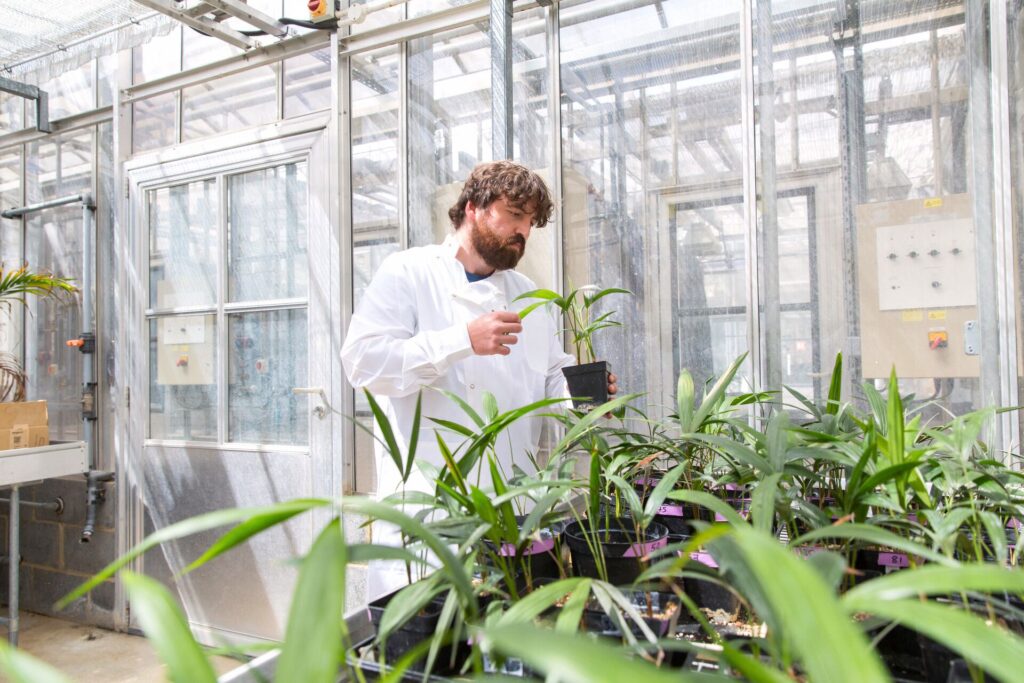Study a Master’s degree in a Living Planet specialism
Imperial is a global world-leading university ranked 1st in the UK and 2nd in the world (QS, 2026).

Download our Postgraduate Study Guide.
Ready to apply? The next application deadline is Friday 4 July 2025.
Why study Life Sciences at Imperial?

Unique research environment
Silwood Park offers a specialised setting for Life Sciences, featuring diverse habitats such as grasslands, lakes, and woodland. Study ecosystems with our captive mosquito and sparrow populations, bee colonies, and global ecosystem models.

Supportive community and networking
Benefit from a supportive environment with excellent networking opportunities. Present your work at a formal conference with fellow Master’s students, preparing you for a successful scientific career.

Dynamic research culture
Immerse yourself in a vibrant research community, working closely with leading scientists. Engage in hands-on practicals, including animal surveys and soil sampling.
1
1st in the UK
for research outputs and research environment
REF 2021
2
2nd in the world
University ranking
QS World University Rankings 2026
3
3rd in the UK
for Life Sciences
QS World Subject Rankings 2025
Find the right course for you
The world’s environmental challenges demand scientific solutions. Our MSc and MRes Living Planet courses provide the training and transferable research skills you’ll need to develop a science-based understanding and create effective interventions.
Explore Silwood Park campus
Study at Silwood Park – the birthplace of modern ecology. Our ecological and environmental sciences courses are based on this rural campus, offering a unique learning experience surrounded by a vast array of natural habitats.
With 77 hectares of green space, Silwood has been used for nearly a century to study the natural world and as a testing ground for Imperial innovations.
Today, the campus is home to researchers and postgraduate students studying all aspects of life on Earth, from soil microbes to tropical forest trees and from freshwater ponds to coral reefs.
The course suited my interests in ecology and also the opportunity to develop valuable computational skills. It seemed like the right step to move forward into a career within research in ecology, as computing and data science skills are required in leading scientific research.
Amy, MSc Computational Methods in Ecology and Evolution
Take a virtual tour

Explore Imperial’s outstanding facilities, see campus highlights and get a 360-degree view of student life.
Explore scholarships

Use our search tool to see what financial awards are available to support your Imperial journey – and be sure to apply before the deadline.
How to apply for a postgraduate degree
- Submit your application
Be sure to check our entry requirements and deadlines. Then, when you’re ready, visit our online portal to start your application. Make sure you have the details of your referees and all supporting documents ready. You may also need to pay an application fee. - Track your progress
Use our online portal to stay informed about the status of your application. We’ll also keep you updated via email. - Receive your offer
Congratulations – you’re a giant step closer to studying at Imperial. You will now need to show proof of qualifications and pay your deposit. You may also need to apply for your student visa after we send your Confirmation of Acceptance for Studies (CAS).
Are you ready to begin your postgraduate journey at Imperial?
Useful links
Use these resources to make sure you have everything you need to submit your application.
Visas and immigration
If you’re an international student, you will need a student visa to study in the UK. Our international support team can provide specialist advice.
Fees and scholarships
Get information on tuition fees, living expenses, funding and scholarships.
Accommodation
As a postgraduate student, you can stay in university accommodation or find private housing.
Application Deadlines
Some departments operate a staged application process with several deadlines throughout the year.
